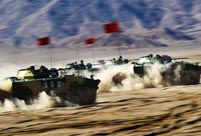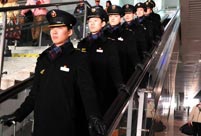 Cockfighting show staged in E. China's Heze during Spring Festival
Cockfighting show staged in E. China's Heze during Spring Festival
 Chinese New Year Flower Fair opens in San Francisco
Chinese New Year Flower Fair opens in San Francisco
 Festivities in Shanghai
Festivities in Shanghai
 PLA navy conducts drill in North China Sea
PLA navy conducts drill in North China Sea
 World's high-tech hotels
World's high-tech hotels
 Li Na poses with trophy on Brighton Beach in Melbourne
Li Na poses with trophy on Brighton Beach in Melbourne
 Six Chinese divers back safely after 300-meter saturation dive
Six Chinese divers back safely after 300-meter saturation dive
 Traditional wedding ceremony of Yao people
Traditional wedding ceremony of Yao people
 Taipei Game Show attracts geeky gamers
Taipei Game Show attracts geeky gamers
BEIJING, Feb. 6 -- The official of Japan's public broadcaster who claimed the Nanjing Massacre never happened should not be "historically shortsighted and ignorant to such an extent," a senior Chinese expert on the massacre has said.
Naoki Hyakuta, a member of the NHK board of governors, said in a speech this week that the Nanjing Massacre never happened, claiming that the massacre is a "propaganda" by the Chinese side and is ignored by other countries.
In a signed article titled "Historical Ignorance or Malicious Mishap" in Thursday's Xinhua Daily, a Nanjing-based paper, Zhu Chengshan, curator of the Nanjing Massacre Memorial Hall, said Hyakuta's remarks not only disavowed the rightful judgment of the International Military Tribunal for the Far East but also induced fresh insult and injuries for those survivors of the atrocities and the relatives of the victims.
"For whom does Hyakuta root and make such madcap uproar?" Zhu wrote, adding that Hyakuta made the comments while campaigning for Tokyo gubernatorial candidate Toshio Tamogami, former Air Self-Defense Force chief and also a renowned anti-China activist.
According to Zhu, during the Japanese occupation of Nanjing, then known as Nanking, foreign journalists including F. Tillman Durdin with the New York Times and Archibald T. Steele with the Chicago Daily News stayed in the city, gaining first-hand experiences on the massacre.
Immediately after leaving Nanjing, Steele telegraphed his article to his headquarters about the Japanese troops killing ten thousand people. Steele became the first person breaking the Nanjing Massacre to the world, Zhu said, adding that Steele later released more articles on the massacre.
Durdin also reported major issues during the massacre including the murder of civilians, the execution of Chinese soldiers and the attack on the U.S. embassy, Zhu added.
According to Zhu, as Nanjing fell, people of foreign nationalities including the United States, Britain, Germany and Denmark who stayed behind jointly established the International Committee for the Nanking Safety Zone to provide refuge for locals who weren't fast enough to escape.
In less than two months, members of the committee were said to have submitted 428 reports on violent acts committed by the Japanese troops as well as 60-plus official letters to the Japanese military and the Japanese Consulate to protest the atrocity, Zhu said.
Zhu mentioned that Rosen, who then worked at the German embassy in Nanjing, reported to the German Foreign Ministry about the Nanjing Massacre. These reports, including accounts that bodies of those in civilian clothes piled up like a mountain in Nanjing's suburb, were kept in German Archives until 1990 when they were recovered.
Meanwhile, Lewis S. C. Smythe, a member of the Nanking International Relief Committee, surveyed the atrocities committed by the Japanese troops in Nanjing between December 1937 and February 1938 and wrote a reportage that claimed about 90 percent of houses in urban and rural Nanjing were looted and damaged, Zhu said.
In addition, H. J. Timperley, who worked for the Manchester Guardian when he was reporting in China around the 1930s, compiled and edited the book "What War Means: Japanese terror in China" based on various reports and letters detailing the massacre at the time, according to Zhu.
American missionary John Magee even filmed and pictured the brutal acts by the Japanese troops in Nanjing with his camera, Zhu added.
According to Zhu, based on abundant testimonies and material evidence, the Tokyo tribunal described the atrocities committed in Nanjing as an unprecedentedly brutal record in modern history.
Zhu said the 1200-plus-page judgment report confirmed that the occupation of Nanjing was premeditated; Japanese invaders brutally murdered civilians and captives; their large-scale massacre lasted for six weeks; they committed killing, raping, looting and burning both in groups and individually; the criminal acts by the middle and lower-level Japanese soldiers were officially tolerated and supported by the Japanese side; sentences were imposed on those involved.
Citing Hyakuta as saying that it was unreasonable that the number of the massacre was put at 200,000 initially and later changed to 300,000, Zhu explained the Tokyo judgment specified that those killed by Japanese troops in the first six weeks after occupying Nanjing amounted to 200,000 but it excluded a huge number of bodies that had been burned or thrown in rivers.
An account of a then Japanese officer put the number of bodies burned or thrown away at 150,000, and the two figures combined was well above 300,000, Zhu said.
According to Zhu, the statistics also corresponded with the judgment of the Nanjing War Crimes Tribunal which said that those killed and burned by the Japanese troops were estimated at 190,000 and additional bodies left scattered around amounted to 150,000 by the count of charity groups.
"Hyakuta and his likes now dream of overturning the history, but their efforts won't be popular and will end up in vain," Zhu added.
 3D film 'The Monkey King' premieres in Beijing
3D film 'The Monkey King' premieres in Beijing  Miss Chinese Int'l Pageant 2014 held in Hong Kong
Miss Chinese Int'l Pageant 2014 held in Hong Kong 'Golden Flowers' in the Spring Festival travel rush
'Golden Flowers' in the Spring Festival travel rush Li Na beats Cibulkova to win Australian Open
Li Na beats Cibulkova to win Australian Open Sexy models at Taipei Game Show 2014
Sexy models at Taipei Game Show 2014 'Living in ice house' competition held in central China
'Living in ice house' competition held in central China  Highlights of Chinese airborne troops'exercises
Highlights of Chinese airborne troops'exercises  All-male high speed train crew during Spring Festival travel rush
All-male high speed train crew during Spring Festival travel rush PLA navy drills in East China Sea
PLA navy drills in East China Sea President Xi visits border troops ahead of Lunar New Year
President Xi visits border troops ahead of Lunar New Year What do Chinese pack in their luggage in Spring Festival Rush?
What do Chinese pack in their luggage in Spring Festival Rush? Blind date fair in Hangzhou of Zhejiang province
Blind date fair in Hangzhou of Zhejiang province Film 'Where Are We Going, Dad' premiered in Beijing
Film 'Where Are We Going, Dad' premiered in Beijing  Australian Open champion Li Na returns to hometown Wuhan
Australian Open champion Li Na returns to hometown Wuhan Twin sisters serve during Spring Festival travel rush for the first time
Twin sisters serve during Spring Festival travel rush for the first timeDay|Week|Month